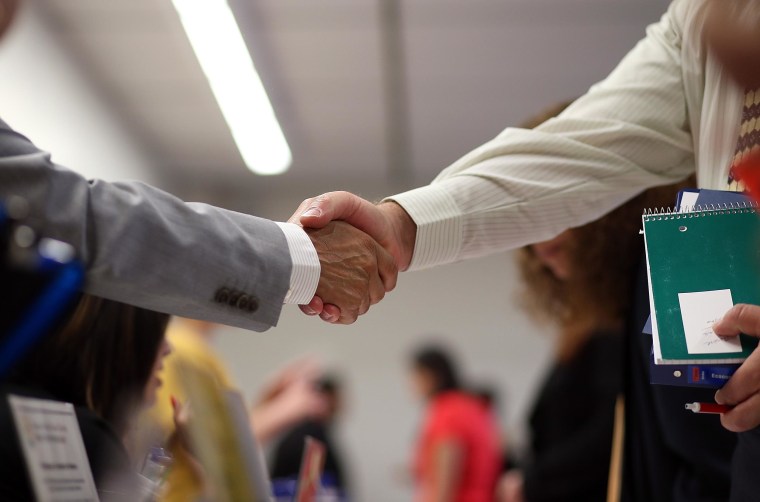You consciously do the grip and grin. But you may unconsciously perform the shake and sniff.
After pumping a person's hand during a greeting, some people take that moment of body-language reading to a deeper level, absentmindedly trying to detect traces of information from the scents left on their palms, new science suggests.
Israeli researchers watched as people used the first moments after a handshake to get a good whiff of the person they just met, lifting their right hands to their noses multiple times, according to the study published in the journal eLife.
After a handshake, “people had their hands at their noses 22 percent of the time,” said coauthor Noam Sobel, a professor and chair of the department of neurobiology at the Weizmann Institute of Science in Rehovot, Israel.
“That is crazy!" Sobel added. "You look at the videos of people and wonder: how did we not notice this before?”

Sobel and colleagues first checked to see if a handshake could actually transfer the kinds of specialized chemicals that are known to spark a response in the nose. Experimenters with latex gloves shook hands with study volunteers and, sure enough, when the gloves were examined, they had easily detectible amounts of the chemicals.
In another experiment, 153 volunteers—unaware researchers had them on hidden camera—were greeted as they sat waiting for the study to begin. Half got a handshake, the rest did not. The researchers secretly filmed the volunteers before, during and after the greeting. After that hello shake, there was a lot of hand sniffing, or at least a lot of hands being raised to the nose.
To verify that people were actually smelling their hands, the researchers fitted another 33 volunteers with nasal catheters to measure breathing. To disguise the purpose of that experiment, the volunteers also were equipped with electrodes from an EEG device. The nasal catheters told the whole story: when a hand was close to the nose, airflow through the nostrils doubled.
The behavior is such an unconscious act that even when the researchers revealed the purpose of the study, many volunteers denied they were sniffing their hands.
“Everyone was blown away when we showed them their own videos,” Sobel said. “It was universal. Nobody was aware of this behavior.”
Sobel suspects that over time hand sniffing evolved as a surreptitious and socially acceptable way to evaluate others.
In the animal world, overt sniffing is a way of scoping out newbies. Humanity, on the other hand, has evolved to find ways to cover up our scents.
“The bottom line,” Sobel said, “is that like all mammals, we communicate using chemosignals. Other mammals—rats, mice, dogs and cats—very overtly sniff each other. That’s not acceptable with strangers in our culture. So we’ve evolved a mechanism to obtain the information in an acceptable way.”
The new research is “very creative and very, very interesting,” said Helen Fisher, a senior research fellow at the Kinsey Institute. “This article is really showing that a lot of olfactory signals are still being sent and people are, in spite of themselves, picking up on them and responding.”
Thus sniffing remained important since humans evolved: figuring out whether the person in front of you is friend or foe, Fisher said.
“You learn a lot from touching a hand,” she added. “Is it clammy? Maybe it’s not a real solid handshake. We instantly notice those things because we’re trying to size this person up. We feel someone is rude if they don’t stick out their hands and shake ours. Maybe that’s not just about social disinterest, but also that they are not allowing us to collect data on who they are and what their intensions are.”
While it’s not clear yet what kind of information people are extracting from smelling hands post-greeting, there’s no question we are constantly processing smells, said Pamela Dalton, an olfactory researcher at the Monell Chemical Senses Center.
Studies at Monell have shown that people can actually “smell” stress. Researchers there introduced volunteers to a cleaned up version of sweat that came from someone who was stressed. “It affected how they felt and how they made judgments about other people,” Dalton said. “It had no smell and they weren’t aware they were smelling anything.”
Linda Carroll is a regular contributor to NBCNews.com and TODAY.com. She is co-author of "The Concussion Crisis: Anatomy of a Silent Epidemic” and the recently published “Duel for the Crown: Affirmed, Alydar, and Racing’s Greatest Rivalry”